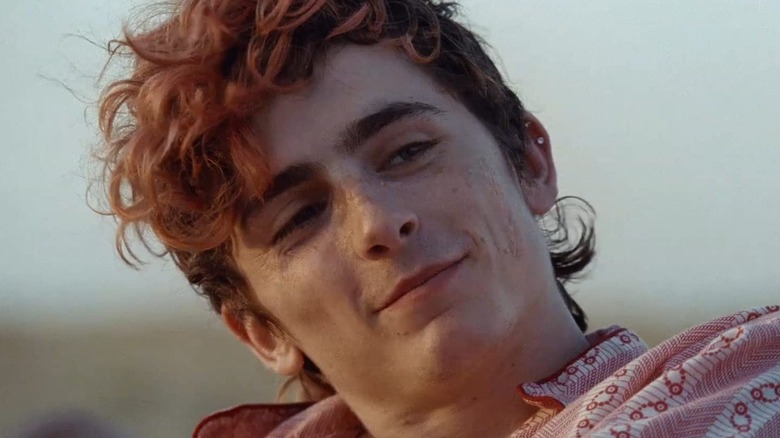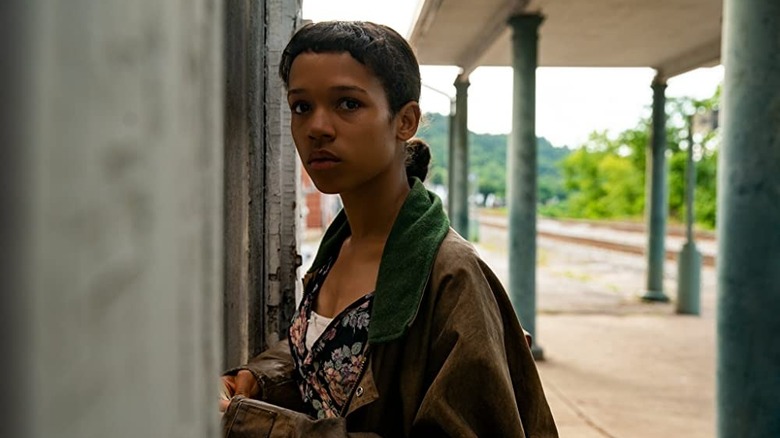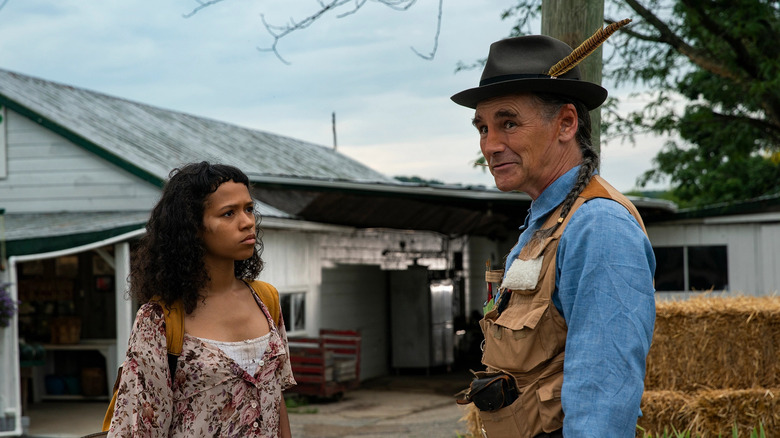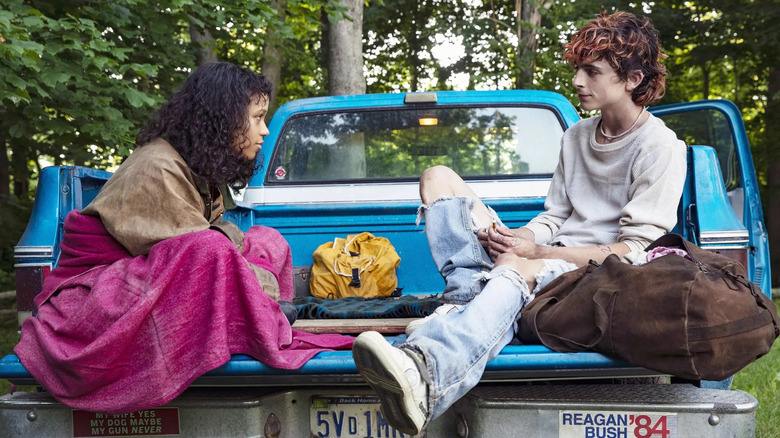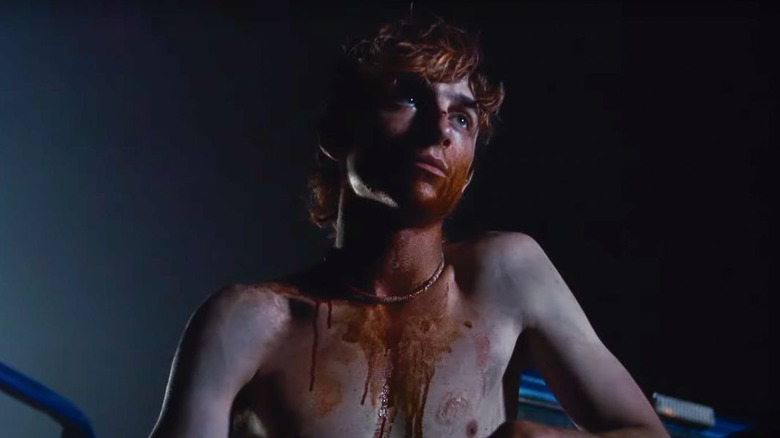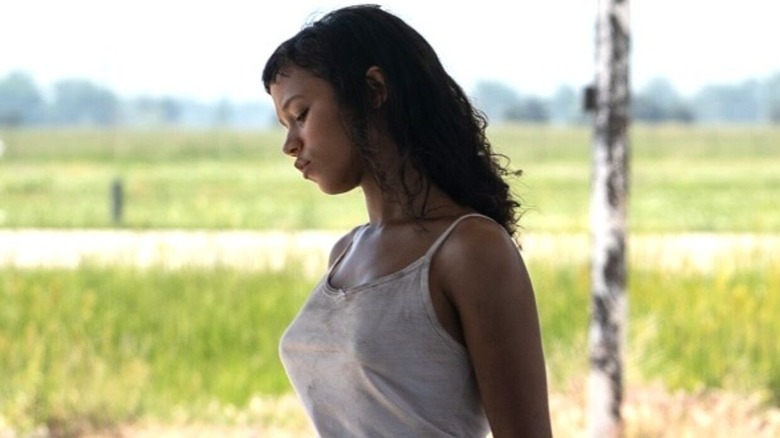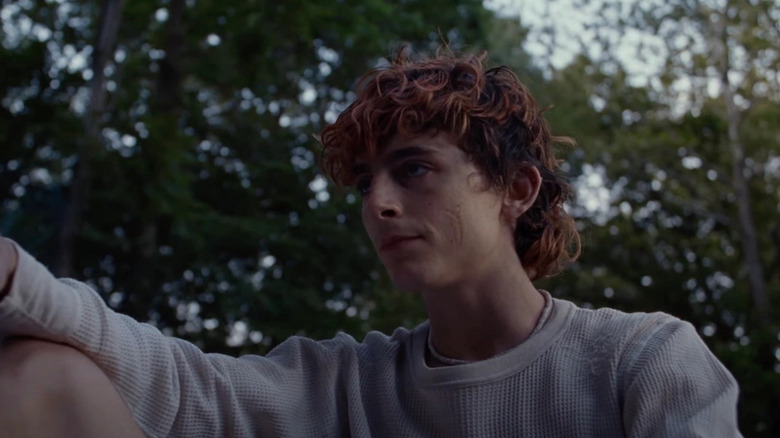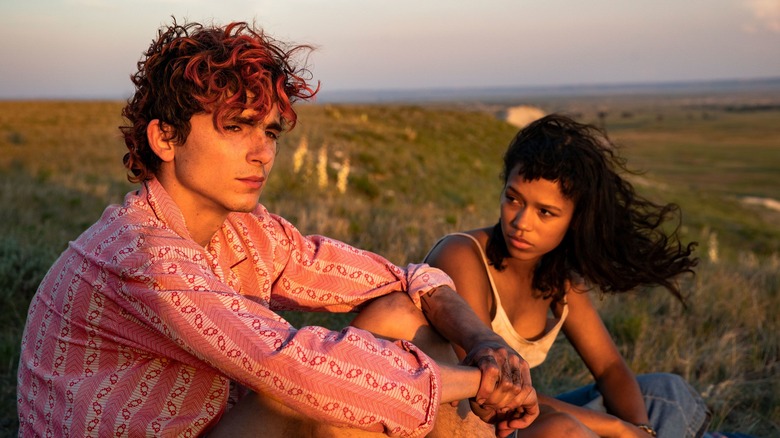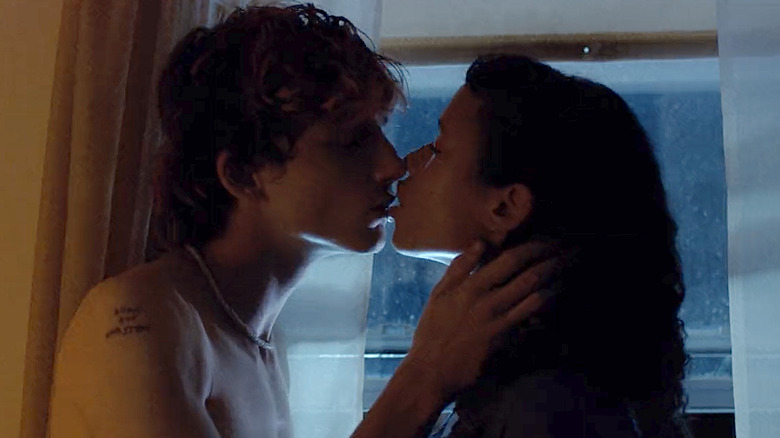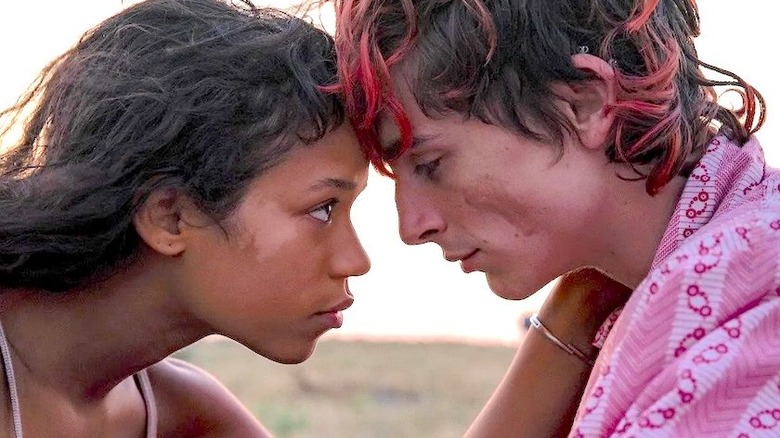The Ending Of Bones And All Explained
Let's just get this out of the way first: It's a tall order to discuss a movie about cannibalism without resorting to food puns, if only because so much of the figurative language we use to discuss cinema borrows from the terms we use to discuss the culinary arts. Italian director Luca Guadagnino, who previously served us "Call Me by Your Name" and the 2018 remake of "Suspiria," has re-teamed with Timothée Chalamet for a film that combines the somewhat dissonant flavors of romantic drama and body horror.
"Bones and All" is an adaptation of a 2015 YA novel of the same name about the relationship forged between two wayward teenagers who can't help the fact that they're compelled to eat other people. The film version brings all the gore that the book version implies to the screen. The premise alone might not be to everybody's taste, and even for those who can stomach rooting for cannibal protagonists (however young, beautiful, and in love they are), some of the most intense scenes still don't go down easily.
With its tonal shifts, plot twists, and fake-out ending, "Bones and All" takes a while to digest. Viewers may not know whether it agreed with them upon the first sitting. And, because Guadagnino is so straightforward and non-judgemental in his depiction of Maren, Lee, and their very particular predicament, it can be tough to figure out how we're supposed to feel and what it's really all about. This is how "Bones and All" arrives at its purposefully unappetizing but steeped-in-meaning finish. Spoilers ahead.
Maren's father considers his job done
Audiences who knew nothing about "Bones and All" going in may have suspected Maren's biggest problems were her relative poverty and her overbearing single father. But after she bites the finger off a friend at a sleepover, the family of two is forced to flee at the crack of dawn. We learn this isn't the first time Maren has bitten someone, and it isn't the first time she and her father have had to relocate to a different city to avoid law enforcement. One day shortly thereafter, Maren wakes up to discover her dad's gone. He's left a tape recording and some cash on the kitchen table.
Maren listens to the tape, which he tells her to destroy once she's finished with it. It's not so much a confession as it is Frank Yearly working through his own complicated feelings. Frank never comes out and says it, but it's obvious he waited until Maren's 18th birthday to abandon her, feeling that it was his responsibility to keep her and others safe as best he could while she was still a minor. Immediately after his departure, Maren tells herself and a bus station attendant that her father thinks she's old enough to live on her own. But later, she experiences a flashback to herself blowing out birthday candles. Presumably, this is the last time she saw her dad.
Frank used the tape to chronicle Maren's history of violence. She killed a babysitter, then a boy at camp, at which point he had to start saying no to normal socialization. When she gets to the end of the recording, Maren isn't surprised that he still holds out hope she can change.
Maren discovers there are others like her
During one of her transfers, Maren notices a strange man under a streetlight. At first, it seems like he could be any random creep harassing a teen girl at a bus station, but then he mentions that he could smell her from a half mile away. The man — who's socially inept, covered in novelty pins, and wearing a hat with a feather in it — introduces himself as Sully, and, more importantly, as a fellow "eater." Maren hadn't realized there were others like her. But Sully takes her back to a stately blue home and begins fixing her a Cornish hen. He warns her that eaters are dangerous, to regular humans and to other eaters, though he promises he doesn't kill (or at least he tries not to).
Sully teaches Maren to use her nose to suss out other eaters as well as human victims who are about to die, so that people like them don't have to murder to get their next meal. Maren discovers an elderly woman struggling to breath on the floor upstairs. Together, she and Sully wait for her to die, then feast. Sully asks her to stay, but she runs to catch her bus after she cleans up and he falls asleep. It isn't long before she meets Lee at a convenience store; Maren is surprised to have met two eaters in a week when she went 18 years without encountering one before. It dawns on her that she's actually part of an underworld community.
Maren and Lee road trip together
Maren didn't get good vibes from Sully (maybe it was all the talking about himself in third person and the slightly too-big tighty whities), but she has a better feeling about Lee, who she smells after he murders and devours the rude guy from the corner store. Initially, Lee doesn't seem like he wants company, but only a few minutes into their first conversation (after she blurts out that she's 18), he invites her into the truck he inherited from his latest victim. They bond over breakfast at a nearby cafe, and before the day's over, Lee and Maren have decided to hit the road together.
Their love story becomes the A plot of "Bones and All," though they have other business to attend to. He has to visit Kentucky to give his little sister driving lessons. She wants to travel to the address listed on her birth certificate to see if she can track down her long-lost mother. Along the way, Maren and Lee get close and become each other's support system. It's less obvious in the movie, but in the book, eaters are tempted most by people who show them affection. This means that making out and hooking up comes with great risk. It's also the reason most of their kind live a solitary life. But Maren and Lee's feelings for each other boil over during a visit to a carnival, and the sexual tension makes both of them hungry.
Eaters have their own rules
Almost every eater Maren meets tells her that she'll have to feed more and more often as she gets older. To accomplish this, every eater develops their own moral code, their own tactics, and their own rituals. Sully says that he mostly waits for elderly folks to pass on, and he keeps a disgusting and comically long braid of his victims' hair in his briefcase as a memento. Maren hasn't figured out guidelines for herself yet, and Lee never fully outlines his system, but it's apparent that he chooses single men whom he thinks won't be missed... even better if they're objectively terrible people. To satisfy Maren's hunger at the carnival, Lee seduces who he thinks is a queer man running a rip-off ball toss game. He slits his throat, and he and Maren gorge themselves.
That night, she's appalled to discover a photo of the man's wife and kids in the visor of his car. Both she and Lee are further disturbed when they cross paths with a veteran eater named Jake and a guy who's basically his familiar, Brad, at a swimming lake. Brad's a regular guy who's just trying cannibalism on for size. Jake, on the other hand, claims to eat his victims bones and all. Maren doesn't believe this is possible, but Jake reveals that to consume a person whole is a rite of passage akin to "going all the way" for the first time. Realizing that Jake has few if any scruples and will no doubt try to eat them, Maren and Lee race off in their pickup truck.
Maren's reunion with her mother doesn't go as expected
Savvy audience members probably suspected from the beginning that Maren's mother left (or was imprisoned or killed) because she was an eater, too. However, Guadagnino and screenwriter David Kajganich throw in a misdirect at an opportune time. Maren eventually makes it to her grandmother's house. Barbara Kearns claims she didn't know her daughter, Janelle, had a child. She's hesitant to give her granddaughter much information. We learn that Janelle wasn't hers biologically. She was left out in the cold by her real parents as a newborn. Barbara didn't approve of Janelle marrying Frank (one might reasonably suspect racism), after which point they had a falling out. Finally, she tells Maren her mother is "no longer with us."
But Maren presses the issue and asks whether Janelle ever hurt anybody. This gets a rise out of Barbara, who comes clean. Janelle is alive and voluntarily committed herself (according to her estranged mother) to a psychiatric hospital in Fergus Falls. Maren goes into the facility alone. A kindly nurse says her mother used to harm others and herself, but that was years ago. When Maren turns the last corner to meet her mom, she isn't prepared for what she sees: Janelle is heavily drugged and has eaten off her own hands and forearms. The nurse gives Maren a letter. We expect the note expresses love and regret. Janelle lunges at Maren and bites at her daughter's face and chest as Maren processes her mother's words — that the world of love doesn't want monsters like them.
Maren learns the truth about Lee's past
The mystery of Maren's mother is, unhappily, solved, but the mystery of Lee's father remains. After they briefly separate following a fight over Maren's reaction to her mother, Maren bumps into Lee's sister Kayla getting ice cream. Kayla provides Maren with what she knows is a sanitized version of the story. Their dad was a drunk. One night, he hit Lee, then Kayla. Lee told his sister to run to town and fetch the police, but when they got back to the house, Lee and Kayla's father was gone and Lee was covered in blood. He was held for questioning for three days, then let go when the blood was tested and discovered to have been his own. The official story is that Lee's abusive father ran off, though townspeople still suspect Lee of having killed him either out of anger or self-defense.
When they reunite, Lee tells Maren the real story. Observant viewers might have guessed from the many bite mark-shaped scars on Lee's face and torso that his father was an eater. On one of the nights that his dad came at him, Lee knocked him out with an ashtray and tied him up with duct tape in an unoccupied barn. He confesses that he ate his father and that he enjoyed the rush it gave him, though it's strongly implied this was a kill-or-be-killed situation. Lee tells Maren that he was suicidal afterwards and only found the will to live in looking out for Kayla.
If you or anyone you know is having suicidal thoughts, please call the National Suicide Prevention Lifeline at 1-800-273-TALK (8255).
Maren and Lee decide to be people for a while
Having both shared their painful pasts with each other, Maren tells Lee that she loves him. While her mother may not have thought that she or her daughter was capable of love, Maren decides she is and proposes that she and Lee try to just be "people" for a while. With the weight of the world off their shoulders, the couple reasons that they'll drive their truck and see the country until it breaks down, then they'll stay where they end up. That turns out to be Ann Arbor, Michigan. They get an apartment. Maren, who's an avid reader and, by the looks of it, a Tolkien fan, applies for a job at the campus bookstore. We hear about their newfound domestic bliss through letters and phone calls to Kayla.
Throughout "Bones and All," we've seen the miserable conditions that both Lee and Maren are used to living in. Neither has had stable housing or economic security for quite some time, but their apartment in Ann Arbor appears to be well maintained, and they look happier and healthier than ever before. This would indicate that they're still finding ways to feed. It isn't at all clear that being "people" means sticking to food from the grocery store. But, despite their affliction, they seem to have carved out a sense of peace, safety, and acceptance that both have long desired.
A tragic turn of events forces Maren to do the unthinkable
"Bones and All" is the kind of movie that combines artistry with shock value. Anyone who thought its premise through to its logical conclusion could probably have guessed what would transpire at the end. But again, filmmakers trick us; this time with that fake-out ending in which we think Lee and Maren have found their happily ever after. Not so. Sully, unhinged as ever, has broken into their apartment. Maren sees his bag when she gets home from work, and she braces herself for the possibility that he's already killed Lee.
Instead, he appears out of nowhere and pins her to her bed while holding a knife to the side of her face. He's angry that she spurned him and seems poised to eat her as punishment. Lee arrives home just in time and is able to subdue Sully by holding a grocery bag over his head, but not before Sully stabs him near his armpit. Maren and Lee drag his body to the bathtub where he expires. Maren begins to snack away, but Lee slumps against the wall. His lung has been pierced. As she looks in Sully's bag for something to treat the wound with, she and Lee discover that Kayla's braid is Sully's most recent souvenir.
Knowing he will die, Lee tells Maren to consume him. At first, she rejects this idea, but their impassioned kissing quickly turns into something more as she begins to eat him alive. Shots of the blood soaked apartment followed by a totally clean apartment imply she ate him bones and all, symbolically completing her journey of self acceptance.
It's all a metaphor
On the surface, "Bones and All" is a movie about people who are driven to eat other people. Beyond that skin deep plot description, it's pretty overtly a story about inherited trauma (and a pretty nihilistic one at that) from abuse, addiction, and myriad other unfortunate circumstances. Maren's condition was passed down to her from her mother, who left when she was a baby. She suffered for years without a mother to guide her and with a father who resented her and didn't know how to care for her. Surely, at least one of the parents who left infant Janelle behind was a genetic carrier, too.
Lee inherited his cannibalistic traits from his father and wears his physical wounds for all to see, while his emotional wounds are hidden, much like real-world survivors of abuse. Jake even tells Lee that he looks like every junkie he's ever met. The monster in overalls might think he's well-adjusted, but he's a person who's lost all sense of dignity, empathy, or boundaries. And Sully has been unwell and isolated for so long that he's gone from sad and awkward to deranged and dangerous. All of these characters are forced into the dark recesses of society. They feel hopelessly broken and incapable of sustaining meaningful relationships. And in the end, "Bones and All" doesn't have a solution for them. It's a metaphor for how inhospitable the world is for people who have been the victims of cruel nature and nurturing.
